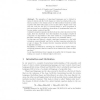Free Online Productivity Tools
i2Speak
i2Symbol
i2OCR
iTex2Img
iWeb2Print
iWeb2Shot
i2Type
iPdf2Split
iPdf2Merge
i2Bopomofo
i2Arabic
i2Style
i2Image
i2PDF
iLatex2Rtf
Sci2ools
100
click to vote
CSL
2003
Springer
2003
Springer
Modular Semantics and Logics of Classes
The semantics of class-based languages can be defined in terms of objects only [8, 7, 1] if classes are viewed as objects with a constructor method. One obtains a store in which method closures are held together with field values. Such a store is also called “higher-order” and does not come for free [13]. It is much harder to prove properties of such stores and as a consequence (soundness of) programming logics can become rather contrived (see [2]). A simpler semantics separates methods from the object store [4, 12]. But again, there is a drawback. Once the semantics of a package of classes is computed it is impossible to add other classes in a compositional way. Modular reasoning principles are therefore not obtainable either. In this paper we improve a simple class-based semantics to deal with extensions compositionally and derive modular reasoning principles for a logic of classes. The domain theoretic reasoning principle behind this is fixpoint induction. Modularity is obtai...
Related Content
| Added | 06 Jul 2010 |
| Updated | 06 Jul 2010 |
| Type | Conference |
| Year | 2003 |
| Where | CSL |
| Authors | Bernhard Reus |
Comments (0)

